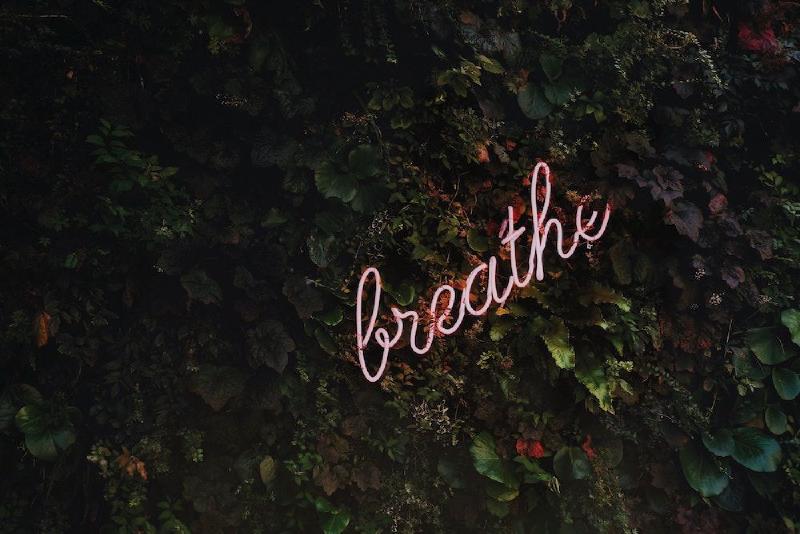This is a simple post about something that you participate in every day. You rarely intervene, and in general, you’re not required to.

Even so, 20 to 30 thousand times a day, you breathe.
Breathing is unique in that it occurs automatically—even when we’re unconscious—but is also able to come under conscious control.
Our breath sits at the intersection of mind, body, blood and brain, unifying them in one living rhythm, and finally binding our bodies into a much greater reciprocity with outside and Other:
I am breathing deeply and slowly in order to summon sleep, and suddenly it is as if my mouth were connected to some great lung outside myself which alternately calls forth and forces back my breath. A certain rhythm of respiration, which a moment ago I voluntarily maintained, now becomes my very being, and sleep, until now aimed at… suddenly becomes my situation.
Why?
The way we breathe strongly correlates with our stress and mental wellbeing, via the sympathetic and parasympathetic nervous systems.
Stress has huge costs for us personally, and racks up a fierce tab across the country as a whole, as our health services try to cope with the anxiety, overwhelm and physical disease that follows in the wake of prolonged stress.
One simple and effective means of reducing stress is through reconnecting with our breath. It costs nothing, requires no equipment, and is available to you right now. Here are some of the benefits:
- More “feel good”, less pain via increased endorphin production
- Improved attention
- Lowered heart and breathing rate
- Significant decrease in cortisol
- Improved blood pressure
- Improved mood
- Improved digestion. Breathing with your belly (“diaphragmatic breathing”) is a good workout for your internal organs, and particularly stimuates digestion.
- Longer interventions of deep breathing have also been used to treat PTSD, depression and anxiety
There are many ways of manipulating the breath, but we can condense the practices down to a few directives, and just call it breathing well.
How?
Breathing well is simple:
- Breathe deeper, into the belly
- Breathe in, through your nostrils
- Breathe out, longer than you breathe in
Try it for 1 minute. No other secret tricks or mantras are necessary to get started.
The best way I can describe the result is simply “calm”, but it’s often a gateway to so much more. There is a bottomless depth of insight to be plunged whilst simply becoming aware of our breathing. It never fails to refresh.
I often take “micro” breathing breaks away from my laptop. I call them pit stops. I first started using them during a period of therapy for my anxiety, but I still use them when anxiety isn’t an issue.
I shut my eyes and put one hand on my heart, the other on my belly. (The physical contact makes a big difference for me.) I take 10 deep breaths, counting on each out breath. If I’m so distracted that I wonder what number I’m on, it’s a sign I need to start again.
It’s very simple, but it can really make a difference, even (perhaps especially) when I’m reluctant to give it a shot. It’s good to periodically reconnect with the living, breathing body that’s often struggling under the weight of invisible expectations.
Sometimes it’s not even calm or relaxation we need, but rather a recognition of something that we’re already feeling. I find this is often the case when I’m upset or frustrated by something, but haven’t really confronted it yet.
When you’re breathing well it’s hard to ignore what you’re feeling. It’s a powerful lifeline for when you feel isolated from yourself.
BreatheSync
If you want to learn more about breathing in the context of work focus and getting things done, there is a great book called Do Breath: Calm your mind. Find Focus. Get stuff done. It’s written by my friend Michael Townsend Williams.
Michael is described as “an adman turned yoga teacher and mindfulness coach”, and advocates “well-doing”: leading a busy and productive life, but not at the expense of our health and wellbeing.
He is also the co-founder of an iOS app called BreatheSync which combines breathing with heart rate variability (HRV) technology to give you live biofeedback and a resulting Wellness Quotient (WQ); like an IQ for your well-being.
You can watch a 20 minute video of Michael talking about his journey to breathing well. It’s an emotional and revealing talk that it well worth a watch:
So every now and then when you’re tired, stressed or just need a bloody break, try breathing well. Tune in and take the reins for a while.
Breathe deeper, into the belly. Breathe in, through your nostrils. Breathe out, longer than you breathe in.
You might be surprised how much a difference it can make. Do it enough and it will become a habit, and then you’ll have a life-long skill to help you become more resilient and connected in the face of stress.
8 Aug 2018
